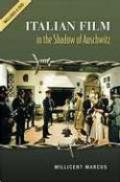
The last decade has witnessed an outpouring of Italian films that deal with Fascism, anti-Semitism and the Holocaust. This would appear to mark a distinct change from the postwar reluctance to represent such an infamous history. Roberto Benigni’s popular Life is Beautiful (1997) is an obvious example, but there have been a number of other works that have not been exported that also attest to a distinct tendency within Italian domestic production to address the issue. Millicent Marcus’s Italian Film in the Shadow of Auschwitz looks at this development, attributing the new acceptance not only to an international film sensation, but to a domestic cultural climate at once receptive to Holocaust representation, and ready to produce its own forms of historical testimony.
Throughout the book, Marcus brings a variety of perspectives - psychoanalytical, ideological, mass cultural - to bear on the question of how Italian filmmakers are confronting the Holocaust, and why now given the sparse output of Holocaust films produced in Italy from 1945 to the early 1990s. What emerges is a fascinating look at how film is being used to confront a particularly damning aspect of cultural history.
Marcus’s study features in-depth analyses of five recent Italian films: Ricky Tognazzi’s Canone inverso, Ettore Scola’s Concorrenza sleale, Andrea and Antonio Frazzi’s Il cielo cade, Alberto Negrin’s Perlasca, and Ferzan Ozpetek’s La finestra di fronte. As an added feature, the book includes a DVD of Scola’s short film ‘43-‘97, which has been unavailable outside of Italy until now.
Millicent Marcus is the winner of the American Association of Italian Studies’ Presidential Award, winner of the Modern Language Association’s Howard R. Marraro Prize, Filmmaking by the Book: Italian Cinema and Literary Adaption,” 1993, and After Fellini: National Cinema in the Postmodern Age, 2002